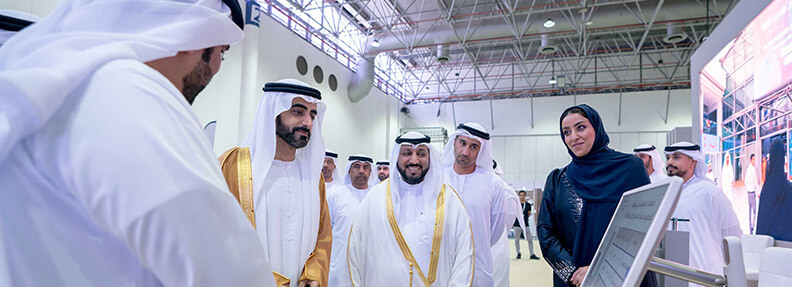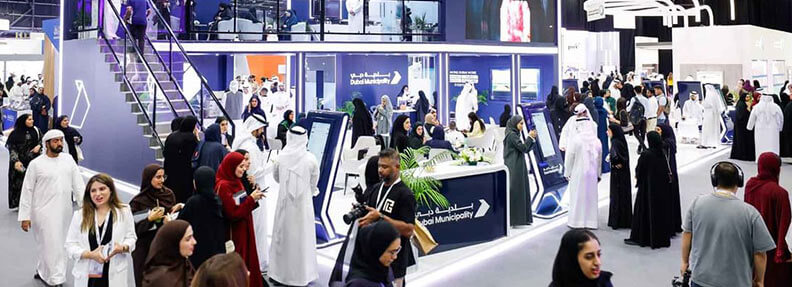
The UAE's AI Revolution: Human and Artificial Intelligence Collaborate in the Future Job Market
The implementation of AI technology in many sectors has helped shape the landscape of the UAE with its implementation in the following industries:
- AI is driving efficiency and growth, especially as the government implements AI in its operations for governance and service delivery, such as paperless government operation and to reduce costs efficiently. Government services have been streamlined, with a reduced duration to process permits or documents through AI powered chatbots or voice assistants. AI can analyze citizen data to understand their needs and preferences. This allows the government to tailor services and communication, leading to a more responsive and citizen-centric experience.
- AI can analyze data from infrastructure like bridges and buildings to predict potential issues and schedule maintenance before problems arise. Predictive maintenance not only saves costs but also enhances public safety.
- Real estate is one of the UAE’s largest growing industries this year and the growth is further driven by AI algorithms. Analysis of vast databases of property valuation are allowing buyers to make more informed decisions.
- The banking sector is utilizing AI for risk management. AI can detect fraudulent activities and enhance credit risk assessments, leading to a safer financial environment.
- The UAE is focusing on sustainability and using AI to combat climate change. AI is used to monitor air quality, predict solar power plant performance, and identify ideal locations for renewable energy sources, and can be used to optimize energy use in buildings and power grids, reducing waste.
- Within healthcare, AI-powered diagnostics and treatment recommendations can improve accuracy and efficiency. Additionally, AI can analyze medical records to identify potential outbreaks and improve disease prevention strategies.
- Traffic management systems can also leverage AI to optimize traffic flow and reduce congestion. Self-driving vehicles powered by AI are a future possibility in the UAE. AI-powered facial recognition technology is streamlining border control processes at Dubai Airport, reducing wait times for travelers.
- AI chatbots in retail can personalize the shopping experience for customers, offering product recommendations and addressing queries in real-time. Additionally, AI can analyze customer data to optimize inventory management and product placement.
- The use of AI within educational systems can provide personalized learning experiences for students, catering to their individual needs and learning styles with AI powered tutors.
- Public security issues can be managed preventively with AI-powered video analytics used to detect suspicious activities and to identify potential threats and prevent crime.
While these sectors grow and processes get streamlined, the rise of AI in the UAE is creating exciting new job opportunities alongside the transformation of existing roles. There will be a growing demand for professionals who can work with AI systems. Potential new sectors and job roles emerging from these changes are:
- AI Engineers: These specialists design, develop, and maintain AI systems. They will be crucial for building and customizing AI solutions for various industries in the UAE.
- AI Ethicists: As AI becomes more sophisticated, ensuring its ethical development and use becomes paramount. AI ethicists will be responsible for creating and enforcing ethical frameworks for AI development and deployment.
- Data Scientists: The foundation of AI lies in data. Data scientists will be in high demand to collect, analyze, and interpret vast amounts of data to train and improve AI models.
- AI Cybersecurity Specialists: As AI systems become more complex, so will the potential cybersecurity threats. Specialists will be needed to safeguard AI systems from hacking and manipulation.
- AI Trainers: These specialists will train AI models on specific datasets and tasks, ensuring the AI functions as intended.
- AI Explainability Specialists: As AI decisions become more complex, there's a need to explain their reasoning. AI explainability specialists will bridge the gap between humans and AI, making AI decision-making processes more transparent and trustworthy.
- Robot Integration Specialists: As robots become more commonplace, specialists will be needed to ensure seamless integration of robots into the workforce, managing their interactions with human co-workers.
- AI-powered Healthcare Specialists: Doctors, nurses, and other healthcare professionals will collaborate with AI for tasks like diagnosis, treatment planning, and drug discovery.
- AI Urban Designers: AI will play a role in designing smart cities, optimizing infrastructure, traffic flow, and energy use. Urban designers will leverage AI tools to create more sustainable and efficient cities.
- AI Marketing Specialists: Marketing professionals will utilize AI for tasks like customer segmentation, personalized marketing campaigns, and real-time marketing optimization.
The Government of UAE is popularizing and implementing its AI strategy through a combination of initiatives, including:
- Establishing the UAE AI Council: This high-level body oversees the implementation of the strategy and coordinates AI efforts across different government entities.
- Launching AI Training Programs: The government offers training programs to equip citizens with AI skills and prepare them for future jobs.
- Investing in AI Research: The UAE is investing in research institutions and universities to advance AI development within the country.
- Partnering with the Private Sector: Collaboration between public and private sectors is crucial for successful AI implementation.
The future of work in the UAE will be about human-AI collaboration. By embracing AI and developing the necessary skills, the UAE workforce can thrive in this new era.



